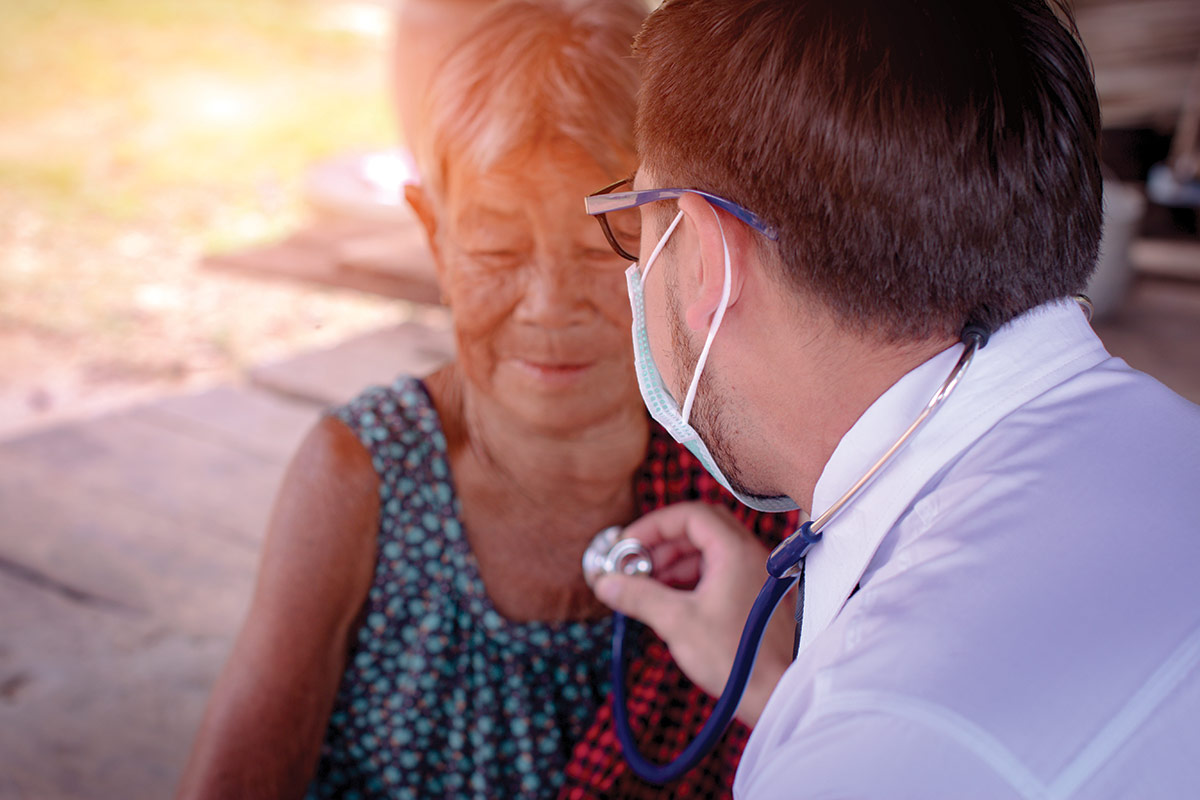ACC 'OutFront' in Advancing Global Solutions to Improve Heart Health

Achieving ACC's Vision of a world where innovation and knowledge optimize cardiovascular care and outcomes requires not only anticipating the needs of cardiovascular clinicians and patients, but a long-term commitment to advancing global solutions to improve the standard of cardiovascular care.
In the decades since its founding in 1949, the ACC has evolved into a global leader in transforming cardiovascular care and improving heart health. With more than 54,000 members worldwide, of which more than 25% reside outside the U.S., the ACC is focused on tangibly reducing the global burden of cardiovascular disease and accelerating advances in heart care in order to take down cardiovascular disease as the #1 killer everywhere.
Among its efforts, the College is working with partner societies, industry and its 42 International Chapters to facilitate collaborations, offer focused, localized education and develop tools and resources for clinicians and patients on the ground. Dedicated programs like ACC's International Conferences, the Global Heart Attack Treatment Initiative (GHATI), NCD Academy and the Global CV Institute are among the examples of this work.
On the conference front, dedicated meetings in Asia, the Middle East and Latin America, often in concert with global society partners or chapters, pair expert faculty from around the world with local experts and leaders for discussions on the latest practice-changing science, regional trends in cardiovascular disease and risk factors, best practices for implementing clinical guidelines and guidance at the point of care, and more. They also offer important opportunities for leadership training, mentoring and engaging with Fellows in Training, as well as the broader cardiovascular care team.
Click here for more on ACC's International efforts. Search "Global Health" in the ACC.22 App and/or Online Program Planner for a full list of "Global Health Spoken Here" sessions.
Launched in 2019, GHATI has already had measurable positive impacts on care delivery for heart attacks in low- and middle-income countries. The program brings together ACC experts from around the world, including members of the College's Assembly of International Governors, with cardiology teams at participating institutions to establish systems for tracking patient encounters and collecting data on outcomes. ACC.22 will highlight some of the latest research coming out of the program, including two-year outcomes on STEMI management in 4,015 patients enrolled in the program as part of the Late-Breaking Clinical Trial V Session on Monday. The hope is to grow the program to be a model for other countries to improve systems of care for heart attack and ultimately reduce mortality.
NCD Academy is another visionary program that builds on ACC's Global Prevention Program. Launched in 2016, it aims to equip primary care clinicians worldwide with the latest science and resources needed to stem the rising tide of cardiovascular disease. The free, online program uses eLearning technology to enable interactive patient cases and games in a fully on-demand and mobile-friendly environment. Content is developed through an interdisciplinary partnership network of advocacy organizations and medical societies led by the ACC. Current NCD Academy courses address cardiovascular disease and stroke prevention, cancer, mental health, diabetes and most recently global advocacy.

Dipti Itchhaporia, MD, FACC
"Globally, we have found ways to continue to accelerate our work around the world in partnership with our International ACC Chapters and international cardiovascular societies," said ACC President Dipti Itchhaporia, MD, FACC, and ACC CEO Cathleen C. Gates in a recent letter to members. "Programs like GHATI and our NCD Academy are providing important on-the-ground education to help improve heart attack outcomes and to meet global targets for reducing noncommunicable diseases. We are truly stronger together."
Other global efforts include expansion of the College's NCDR registries to hospitals and health systems in countries around the world, as well as train-the-trainer programs for nurses and clinicians. Joint webinars on hot topics like COVID-19, women in cardiology and innovation are also important sources of education and connectivity – especially in today's pandemic world. Growing the next generation of global leaders is also critical and several programs are underway thanks to support from member leaders like ACC Past President William A. Zoghbi, MD, MACC; ACC BOT Member Hani K. Najm, MD, MSc, FACC; and Wael A. Almahmeed, MD, FACC, as well as dedicated exchange programs between ACC State and International Chapters. Translated clinician tools like Guidelines Made Simple and the Multilingual ASCVD Risk Estimator, along with translated CardioSmart patient education, are also vital tools in ACC's global toolbox.
"Transforming cardiovascular care and improving heart health can't be done alone, which is why global collaboration is so important," says Itchhaporia. "The intent of ACC's international acceleration strategy is to put emphasis on new and existing collaborations that allow for broader reach and enable us to leverage our combined strengths and build on our past successes to create tools and resources that speak directly to the local needs of our members and colleagues everywhere."
Keywords: ACC22, ACC Annual Scientific Session, Newspaper Article, ACC Scientific Session Newspaper
< Back to Listings

